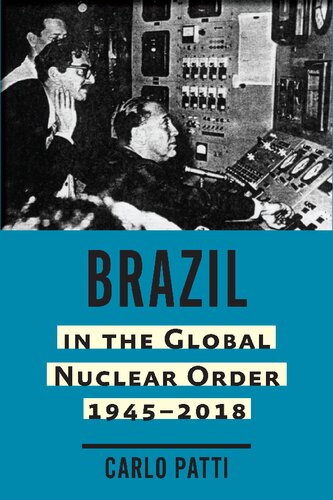

Most ebook files are in PDF format, so you can easily read them using various software such as Foxit Reader or directly on the Google Chrome browser.
Some ebook files are released by publishers in other formats such as .awz, .mobi, .epub, .fb2, etc. You may need to install specific software to read these formats on mobile/PC, such as Calibre.
Please read the tutorial at this link: https://ebookbell.com/faq
We offer FREE conversion to the popular formats you request; however, this may take some time. Therefore, right after payment, please email us, and we will try to provide the service as quickly as possible.
For some exceptional file formats or broken links (if any), please refrain from opening any disputes. Instead, email us first, and we will try to assist within a maximum of 6 hours.
EbookBell Team

0.0
0 reviewsThe first comprehensive and definitive history of Brazil's decision to give up the nuclear weapon option.
Why do countries capable of "going nuclear" choose not to? Brazil, which gained notoriety for developing a nuclear program and then backtracking into adherence to the nonproliferation regime, offers a fascinating window into the complex politics surrounding nuclear energy and American interference.
Since the beginning of the nuclear age, author Carlo Patti writes, Brazil has tried to cooperate with other countries in order to master nuclear fuel cycle technology, but international limitations have constrained the country's approach. Brazil had the start of a nuclear program in the 1950s, which led to the United States interfering in agreements between Brazil and other countries with advanced nuclear industries, such as France and West Germany. These international constraints, especially those imposed by the United States, partly explain the country's decision to create a secret nuclear program in 1978 and to cooperate with other countries outside the Nuclear Non-Proliferation Treaty [NPT] regime, such as Argentina and China. Yet, in 1998, Brazil chose to adhere to the Nuclear Non-Proliferation Treaty it so actively opposed only three decades prior, although the country still critiques the unfair nature of the treaty.
Patti draws on recent declassified primary sources collected during years of research in public and private archives in eight different countries, as well as interviews with former presidents, diplomats, and scientists, to show how US nonproliferation policies deeply affected Brazil's decisions. Assessing the domestic and international factors that informed the evolution of Brazil's nuclear diplomacy, Brazil in the Global Nuclear Order, 1945-2018 also discusses what it means with respect to Brazil's future political goals.